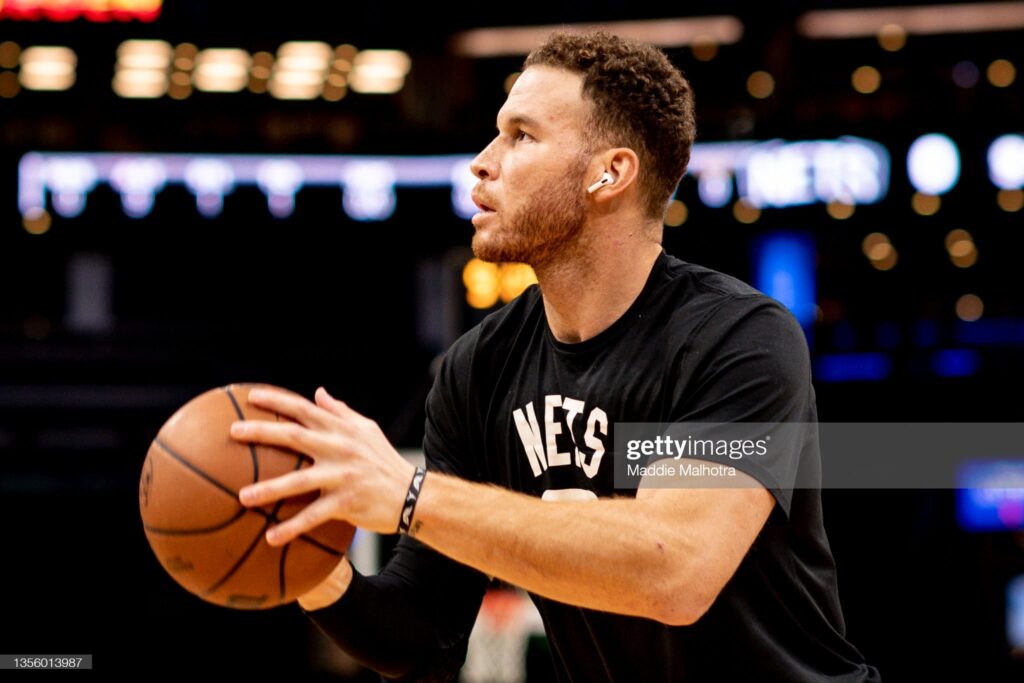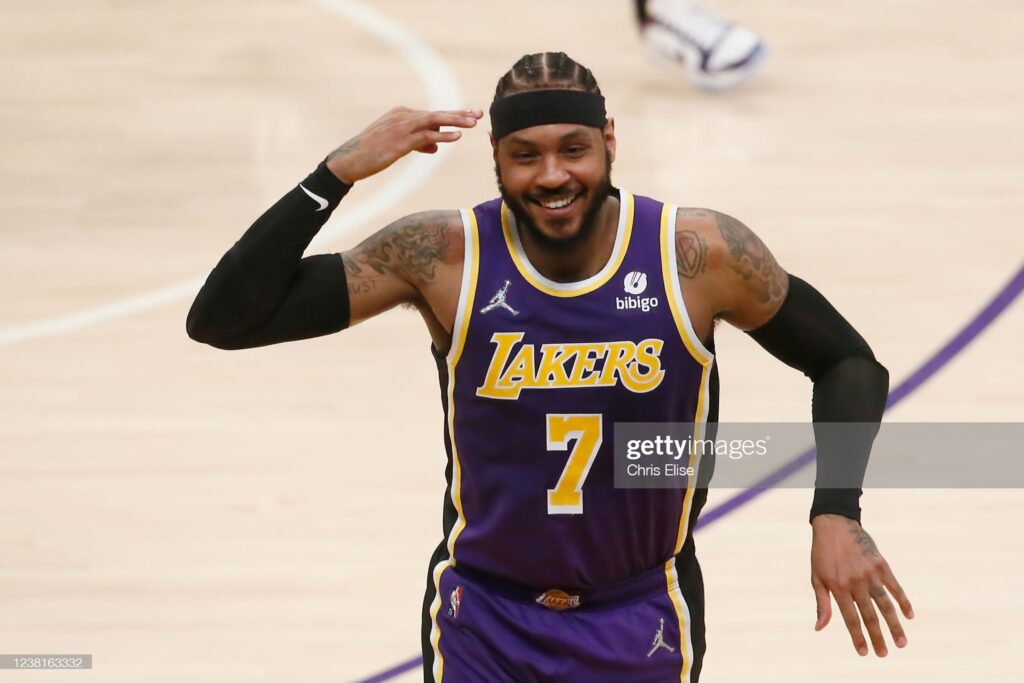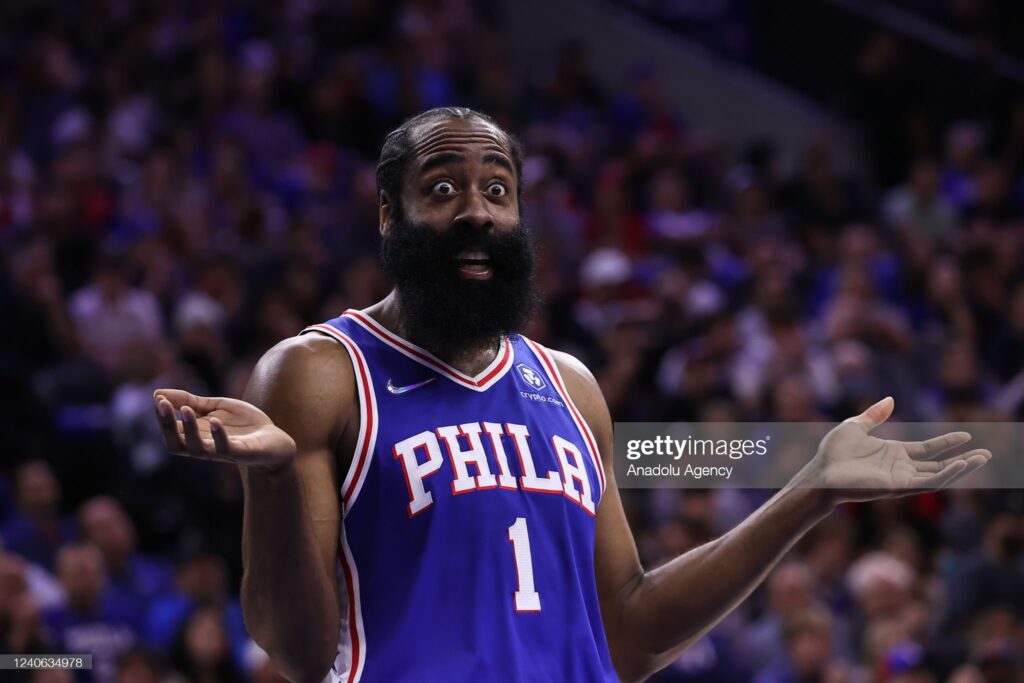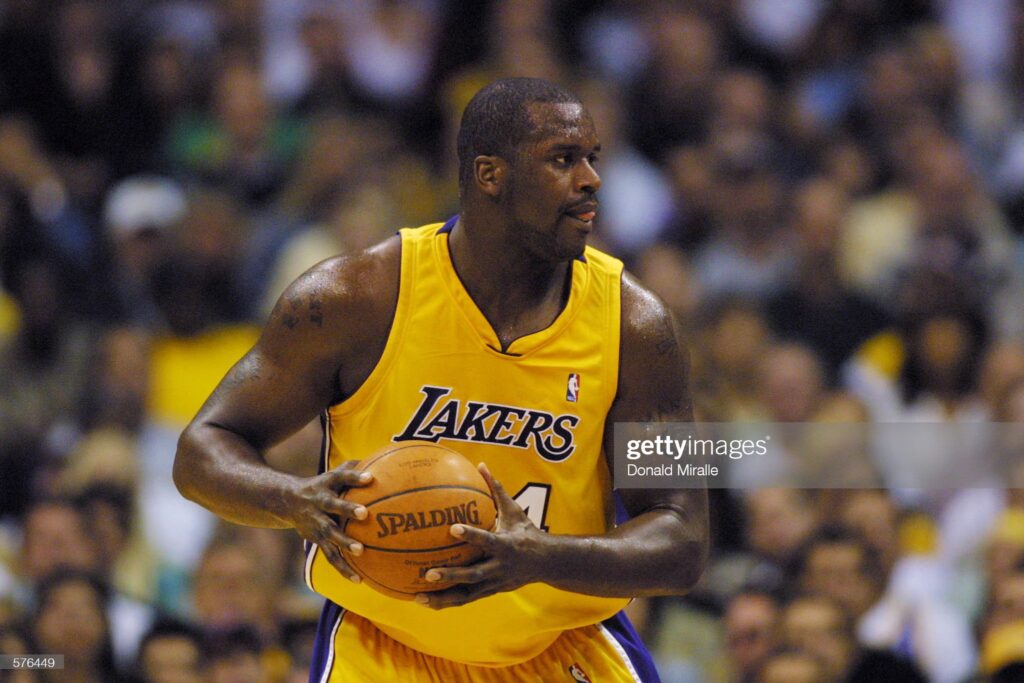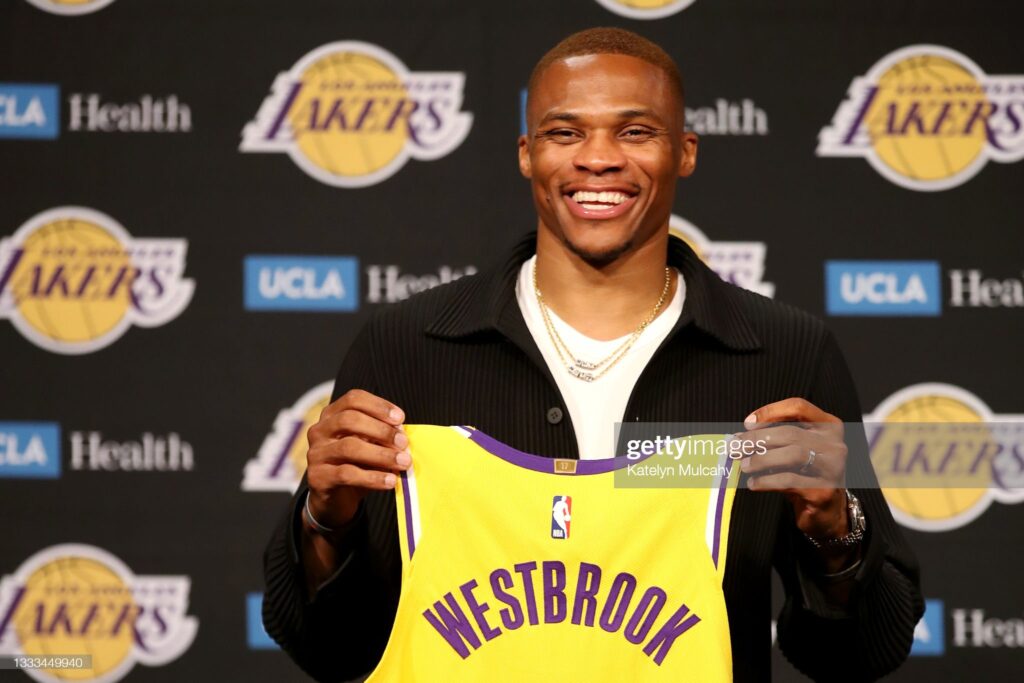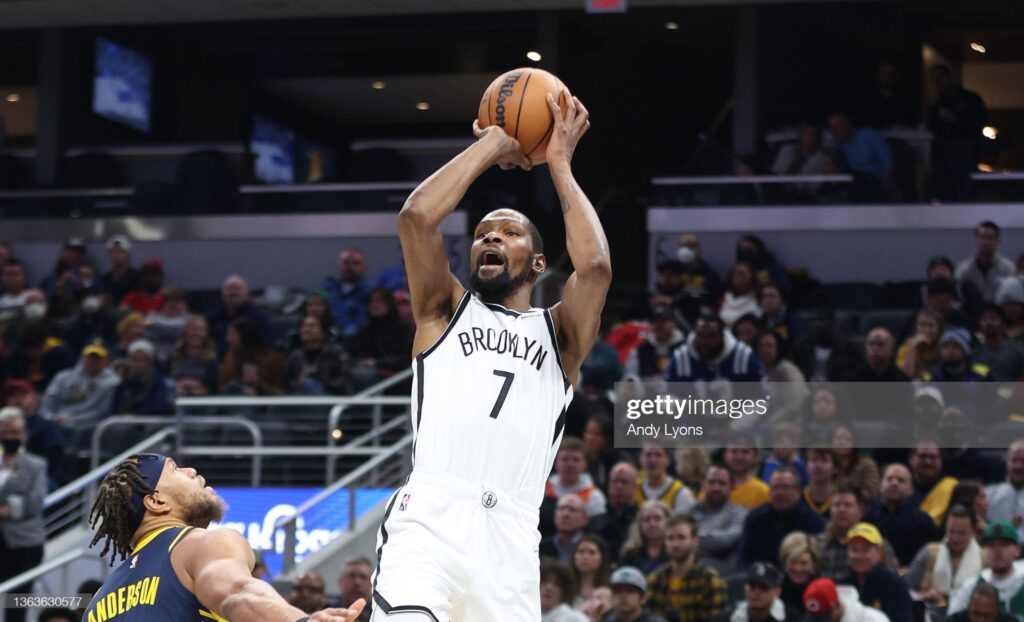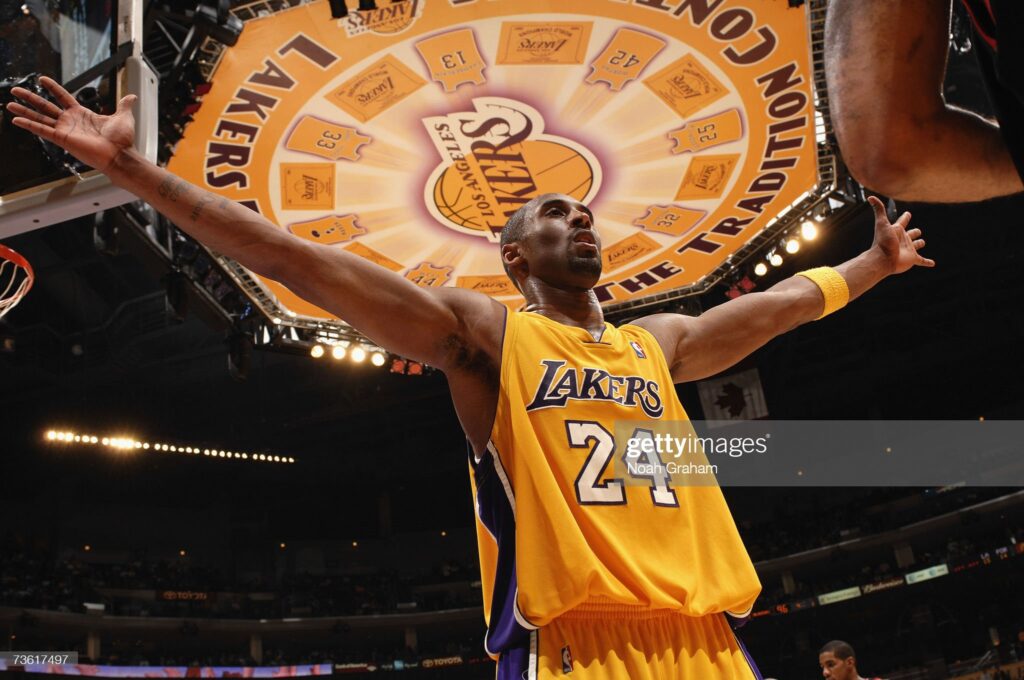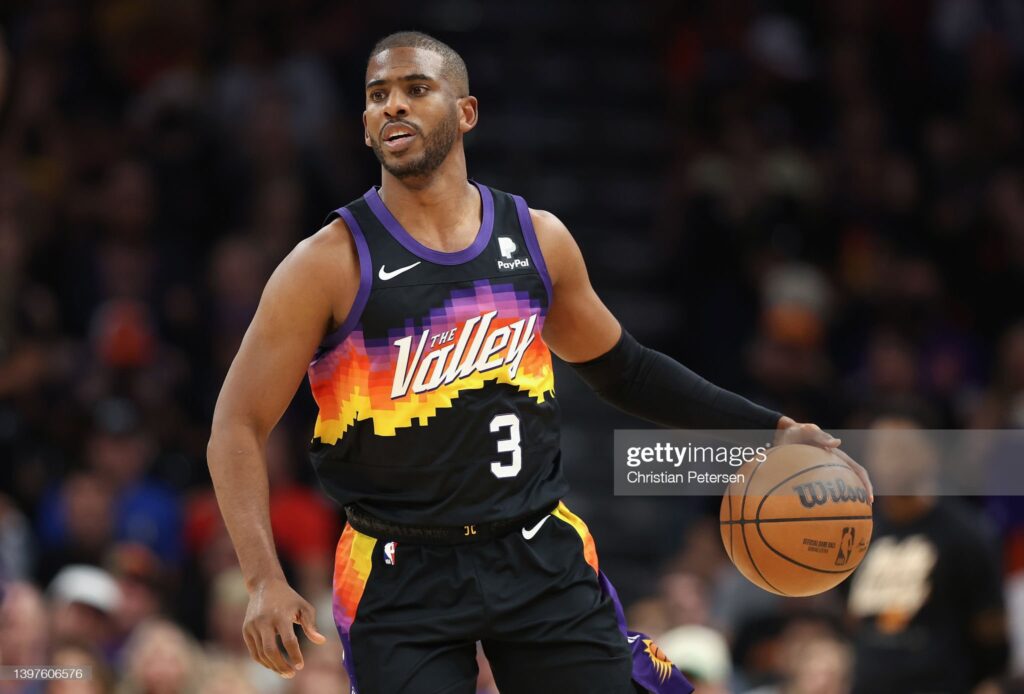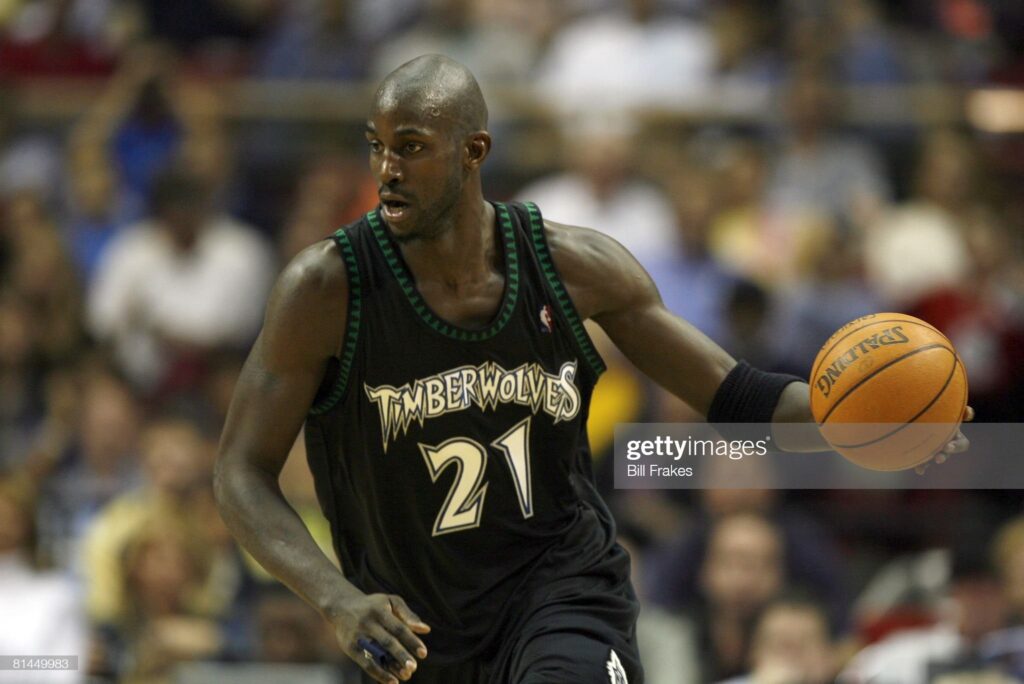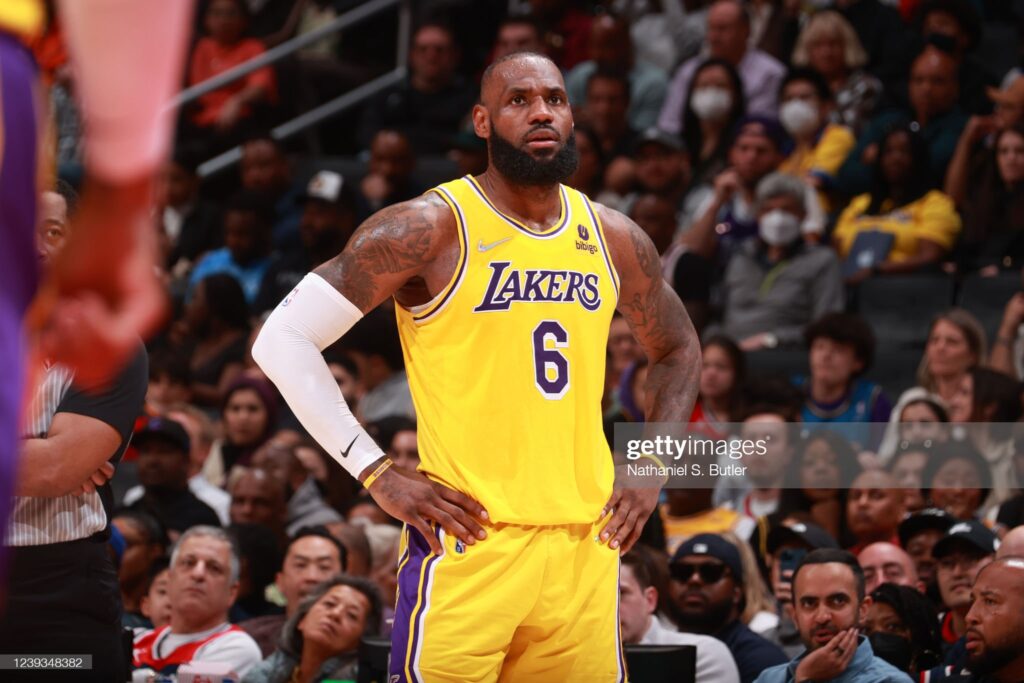Michael Jordan has six NBA championships, whereas LeBron James has four. James is second in most career points scored in NBA history, while MJ has five MVP trophies. Jordan holds the record for career points per game, while James led the NBA in assists at the age of 35. The debate is never-ending.
James continues to play towards his fifth ring, and there is a conversation about his standing on the list of the Greatest NBA Player of All Time.
There is value in comparing him to others like Kobe Bryant, and Bill Russell. However, the question on everyone’s mind is – How does he compare to Michael Jordan?
Before you jump in, it is important to understand that the ONLY way to establish a G.O.A.T. debate is by comparing what each player did in their era. Because we do not have a time machine and have no clue how an 18-year-old James would have survived the 80’s, nor do we know how Jordan would’ve handled himself during the social media age now.
The article below is an objective breakdown of the careers of the players who are the most active in the G.O.A.T. conversation.
Part I – Rings, Awards & Numbers
Rings / NBA Championships
Michael Jordan has six rings (or) NBA Championships (’91, ’92, ’93, ’96, ’97, ’98), while LeBron James has four (’12, ’13, ’16, ’20).
They were undoubtedly the best players on their respective teams during these championships, as evidenced by them winning the Finals MVP trophies in their respective championship seasons.
Team Records & Standing
You may ask, why do team records and standings matter in the conversation between two individual players.
This is because basketball is a team game.
Also because there is little doubt that both Michael Jordan and LeBron James were the best players on their team, with the exception of Jordan on the Wizards.
Michael Jordan
| Season | Conf. Seed | NBA Seed |
| 1985 | 7 | 14 |
| 1986 | 8 | 19 |
| 1987 | 8 | 14 |
| 1988 | 3 | 7 |
| 1989 | 6 | 9 |
| 1990 | 2 | 5 |
| 1991* | 1 | 2 |
| 1992* | 1 | 1 |
| 1993* | 2 | 3 |
| 1995 | 5 | 9 |
| 1997* | 1 | 1 |
| 1996* | 1 | 1 |
| 1998* | 1 | 1 |
| 2001 | 10 | 19 |
| 2003 | 9 | 21 |
Jordan’s teams finished in the top three of the conference eight times and the NBA six times.
His teams topped the conference and the NBA five and four times respectively.
He has missed the playoffs twice.
Jordan made the NBA playoffs in 13 of his 15 seasons.
LeBron James
| Season | Conf. Seed | NBA Seed |
| 2004 | 9 | 21 |
| 2005 | 9 | 18 |
| 2006 | 3 | 6 |
| 2007 | 2 | 7 |
| 2008 | 4 | 13 |
| 2009 | 1 | 1 |
| 2010 | 1 | 1 |
| 2011 | 2 | 3 |
| 2012* | 2 | 4 |
| 2013* | 1 | 1 |
| 2014 | 2 | 5 |
| 2015 | 2 | 7 |
| 2016* | 1 | 3 |
| 2017 | 2 | 5 |
| 2018 | 4 | 6 |
| 2019 | 10 | 20 |
| 2020* | 1 | 3 |
| 2021 | 7 | 8 |
| 2022 | 11 | 23 |
James’ teams finished in the top three of the conference twelve times and the NBA six times, topping the conference and the NBA five times and thrice respectively.
He has missed the playoffs four times.
James made the NBA playoffs in 15 of his 19 seasons.
Awards
Most Valuable Player (MVP)
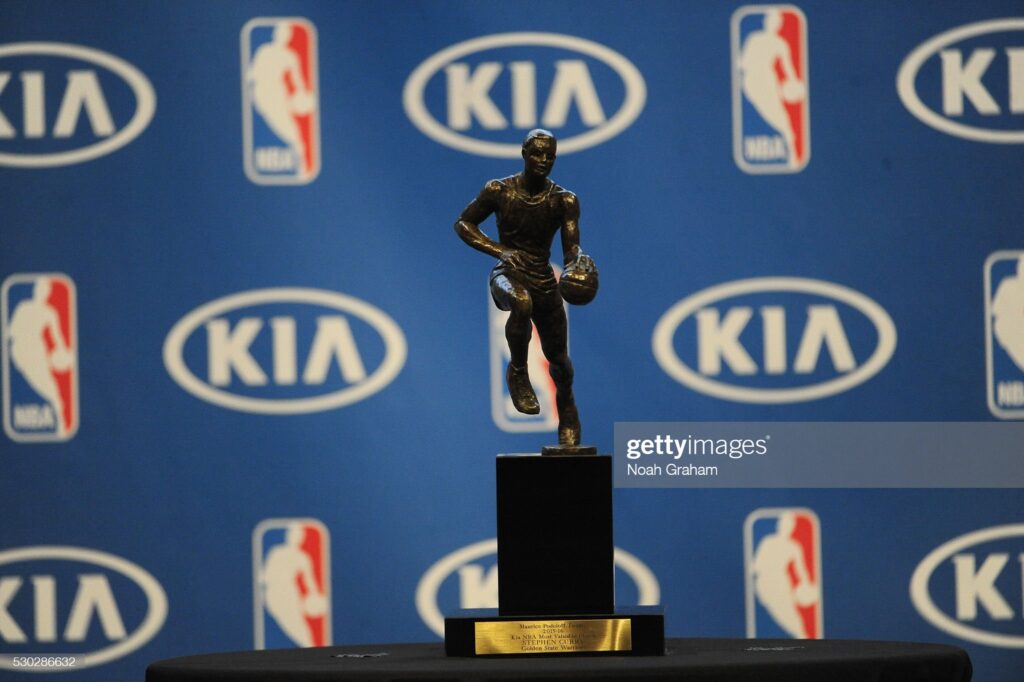
This is arguably the most important regular-season award.
Why arguably?
Because in the history of the NBA, the MVP Award has not always gone to the best player in the league.
Often, the award has gone to other players because voters were either tired of giving it to the same person (like Jabbar, Jordan or James), or were sleeping under a rock.
Some of the famous botched MVP awards are:
Bill Russell (’62) over Wilt Chamberlain or Oscar Robertson.
Wes Unseld (’69) over Earl Monroe.
Dave Cowens (’73) over Kareem Abdul-Jabbar.
Bill Walton (’78) over George Gervin.
David Robinson (’95) over Hakeem Olajuwon.
Karl Malone (’97) and Barkley (’93) over Jordan.
Steve Nash (’06) over Kobe Bryant.
Kobe Bryant (’08) over LeBron James.
Russell Westbrook (’17) over James Harden.
In the above seasons, the player who was most deserving of the award was overlooked for the award.
Nevertheless, it is important to take into account that Jordan has five regular season MVP trophies while James has four.
Jordan won his first MVP Award in his fourth NBA season, while James won it the first time in his sixth NBA season.
The MVP is an vote-in award; you read more about it here.
So how unanimous were these choices? In other words, how many first-place votes did Jordan and James get in their MVP seasons.
| Michael Jordan | LeBron James |
| 1988 (47 out of 90 votes – 52%) | 2009 (109 out of 121 votes – 90%) |
| 1991 (77 / 96 – 80%) | 2010 (116 / 123 – 94%) |
| 1992 (80 / 96 – 83%) | 2012 (85 / 121 – 70%) |
| 1996 (109 / 113 – 96%) | 2013 (120 / 121 – 99%) |
| 1998 (92 / 116 – 79%) |
Over the course of their careers, James has been closer to MVP unanimity than Jordan.
Was that a sign of James’ domination over the NBA, or were Jordan’s adversaries that good?
There are arguments to be made for both sides.
All NBA Team Selections
The All-NBA Team is the closest we have to a perfect system to determine who the top 15 players in a particular season were.
It is a ranking based on voted received by a global group of chosen sportswriters and broadcasters.
In 1988 the NBA expanded the All-NBA Team Selections to three teams instead of two.
There is some criticism that because the award is determined by sportswriters and broadcasters, it can often go to the players who are the most media friendly.
There is no evidence to back up this claim, and there are certain players who are clearly hostile towards the media but still get picked.
The other criticism is that the selection is too “position-centric”. Voters have to select two guards, two forwards, and two centers. This was instituted in 1956.
This is a valid criticism.
James is classified as a forward, however he has historically had the ball in his hands more than the point guards on his team.
Basketball has become a position-less game. I predict that the voting for
Michael Jordan has made an All-NBA team 11 times in his 15-season NBA career.
1st Team All-NBA: 10 times (’87 – ’93, ’96 – ’98)
2nd Team All-NBA : Once (’85)
For those wondering, he was a rookie in ’84 and broke his foot during the ’86 season missing 64 games.
LeBron James has made an All NBA team 17 times in 19 NBA seasons.
1st team All-NBA: 13 times (’06, ’08 – ’18, ’20)
2nd team All-NBA: Thrice (’05, ’07, ’21)
3rd team All-NBA: Once (’19).
All-NBA Defensive Team Selections
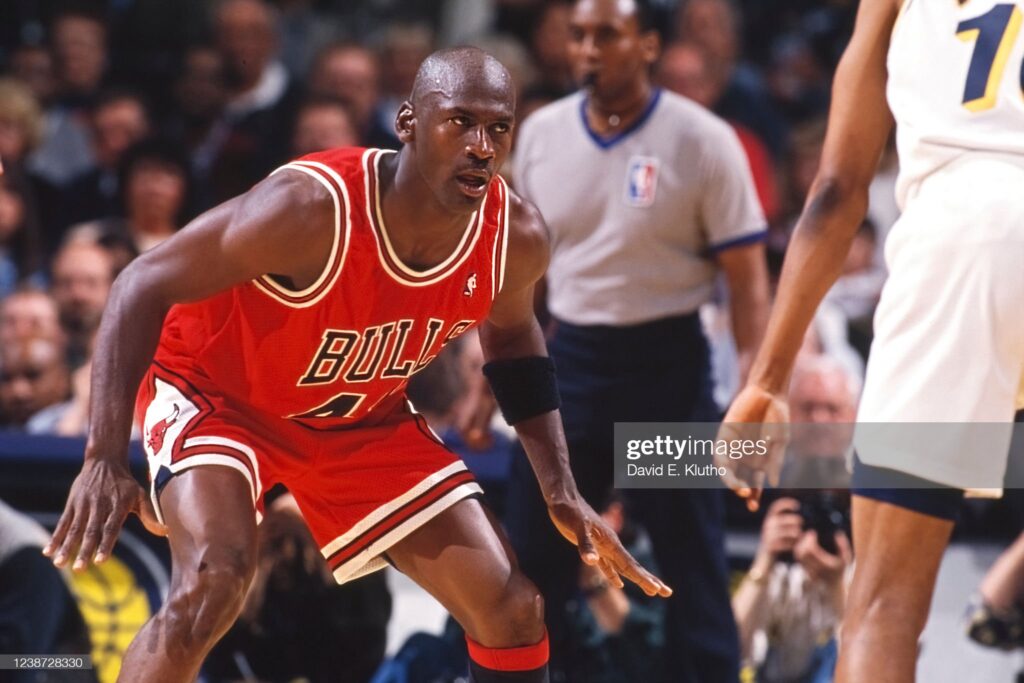
Michael Jordan has made an All-NBA Defensive Team nine (9) times.
1st team All-NBA Defense: 9 times (’88 – ’93, ’96 – ’98).
Jordan also won the 1988 Defensive Player Of the Year Award. He led the league in steals that season, and also in ’90 and ’93.
LeBron James has made an All-NBA Defensive Team five (5) times
1st team All-NBA Defense: 5 times (’09 – ’13)
2nd team All-NBA Defense: once (’14).
NBA All-Star Selections
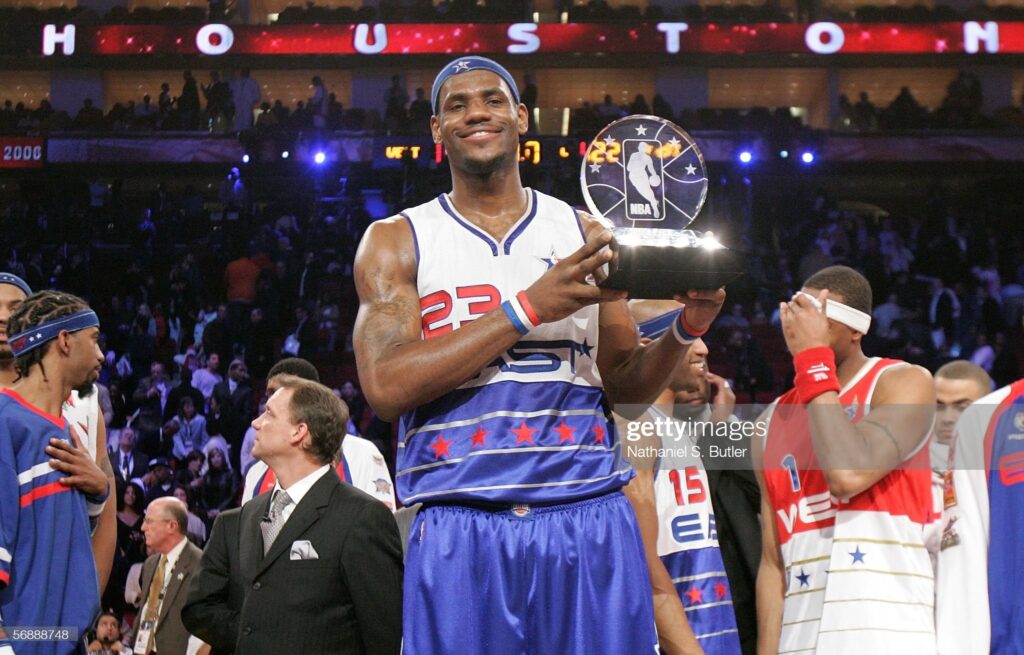
Michael Jordan is a 14-time NBA All-Star, while LeBron James is an 18-time NBA All-Star.
Not only that, they both have also won the NBA All-Star MVP Trophy three times:
Michael Jordan: ’88, ’96, ’98
LeBron James: ’06, ’08, ’18
Jordan missed just the ’95 season – he had returned to the NBA after the All-Star break), while James missed it in just his rookie season (’04).
NBA Rookie of the Year Award
Both Michael Jordan (’85) and LeBron James (’04) have won the NBA Rookie Of the Year Award.
NBA Playoffs
Appearances
Michael Jordan took the Chicago Bulls to the NBA playoffs in his rookie season. They lost to the Milwaukee Bucks who had the third-best record in the NBA that season.
LeBron James led the Cleveland Cavaliers to the playoffs in his third season where they lost to the previous season’s NBA finalists, the Detroit Pistons.
In his fifteen seasons in the NBA, Jordan made the playoffs all thirteen times with the Chicago Bulls and missed them both times with the Washington Wizards.
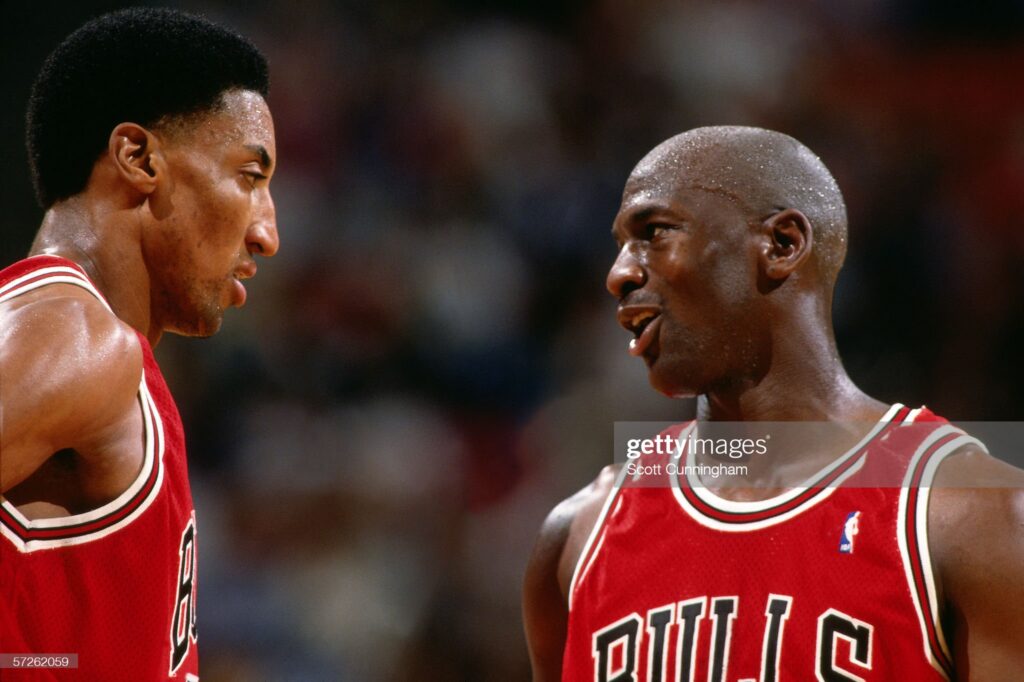
James missed the playoffs four times in his 19-season career – his first two seasons in the league, the 2019, and then the 2022 season.
More impressively, James had not missed the NBA Finals from 2011 to 2018 season, i.e eight straight seasons.
NBA Finals
Michael Jordan reached his first NBA finals in his seventh season, while it took LeBron James just four.
However, Jordan has never lost in an NBA Finals series , while James has lost six out of ten.
Along the way, Jordan was eliminated in the first round thrice (’85 Bucks, ’86 Celtics, and ’87 Celtics), the second round twice (’88 Pistons, ’95 Magic) and the NBA Conference Finals twice (’89 Pistons, and ’90 Pistons).
Of those teams, three went on to win the Finals (’86 Celtics, ’89 & ’90 Pistons).
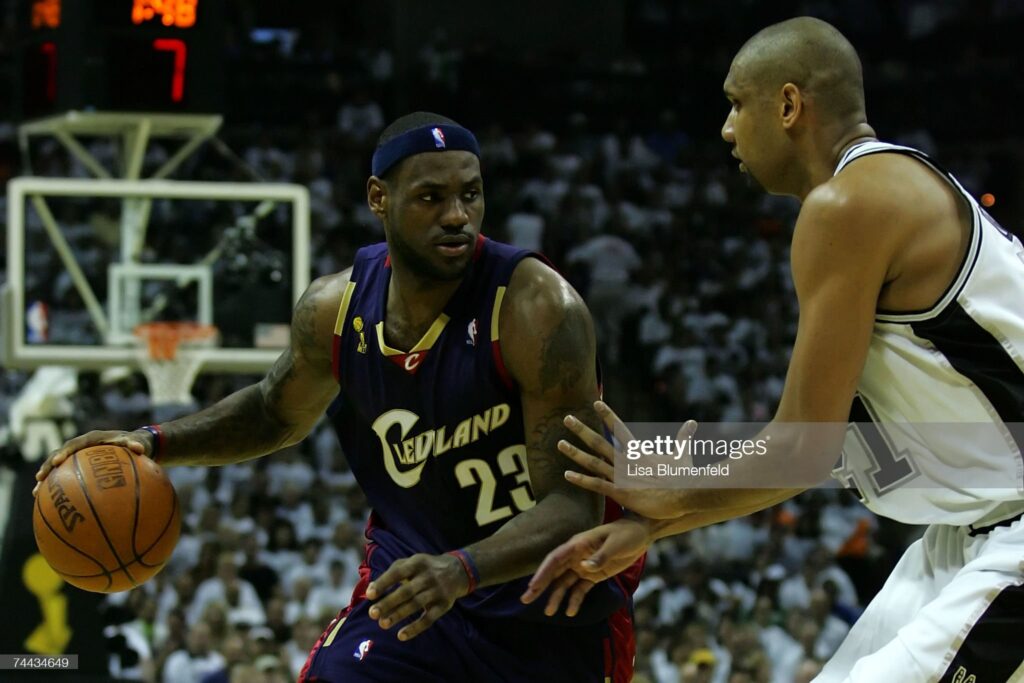
James’ teams have been eliminated once in the first round (’21 Suns), lost the second round twice (’06 Pistons, ’08 Celtics), the NBA Conference Finals twice (’09 Magic, ’10 Celtics) and the NBA Finals six times (’07 Spurs, ’11 Mavericks, ’14 Spurs, ’15 Warriors, ’17 Warriors, ’18 Warriors).
NBA Career Numbers
I would normally break down these numbers to peak career and off-peak career.
Then I realized what a silly idea that was.
When exactly were these two great players off-peak?
Except Jordan’s two seasons with the Wizards, never.
Order of stats: points / rebounds / assists / stocks* (steals+blocks) / FG-3P-FT (shooting %)
NBA Regular Season
Michael Jordan
15 seasons – 1072 games
30.1 / 6.2 / 5.3 / 3.1 / 50-33-83
LeBron James
19 seasons – 1366 games
27.1 / 7.5 / 7.4 / 2.4 / 50-35-73
Points
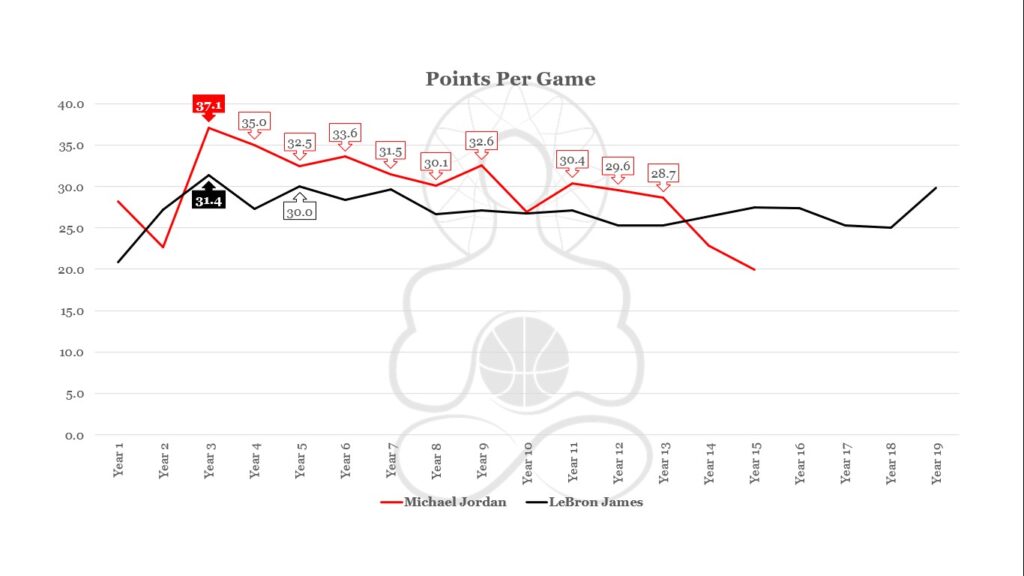
Jordan is a 10-time Scoring Champ (’87 – ’93, ’96 – ’98), while James led the league in scoring once (’08).
Interestingly, both their career highs (Jordan – 37.1, James – 31.4) came in their respective third seasons.
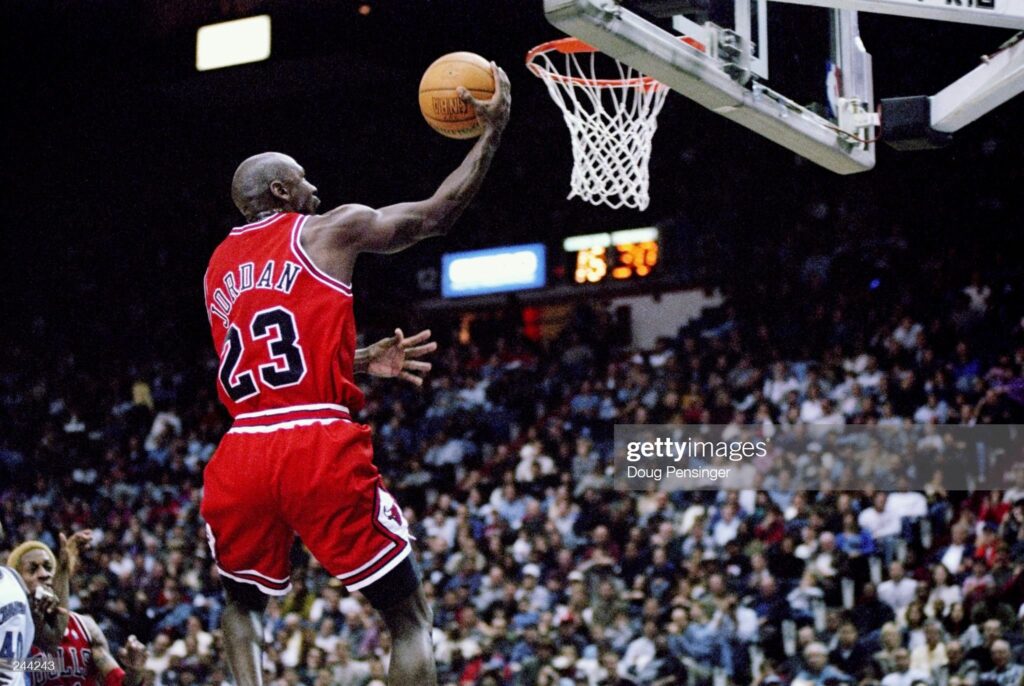
Jordan has averaged 30+ points for a season eight times in his career. James has done this thrice.
Jordan has scored 50 or more points 31 times in the regular season during his career. Of those games, he has scored 60+ points four (4) times. His career-high is the 69 points he scored against the Cleveland Cavaliers on March 28, 1990.
James has scored 50 or more points 15 times in the regular season during his career. Of those games, he has scored 60+ points once, that was his career-high is 61 points he scored against the Miami Heat on March 3, 2014.
Assists
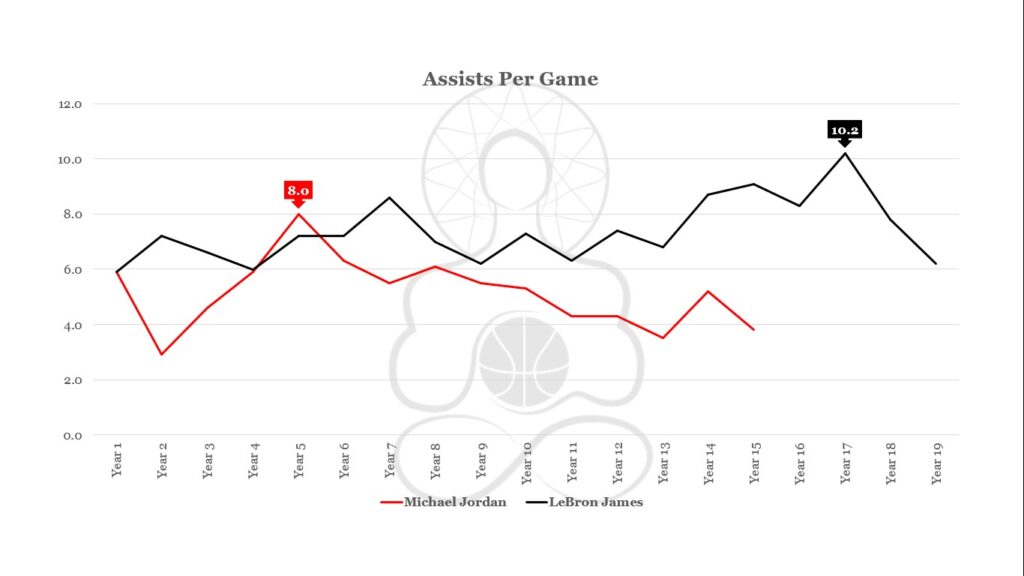
LeBron James led the league in assists (’20), while the highest Jordan ever finished in assists was 10th (’89) where he finished with 8.0 assists per game.
James has averaged 7+ assists twelve times in the regular season during his career, while Jordan has done this once.
Jordan has dished out 10+ assists 76 times in the regular season during his career. Of those games he has dished out 15+ assists five times. His career high is the 17 assists he had against the Portland Trailblazers on March 24th, 1989.
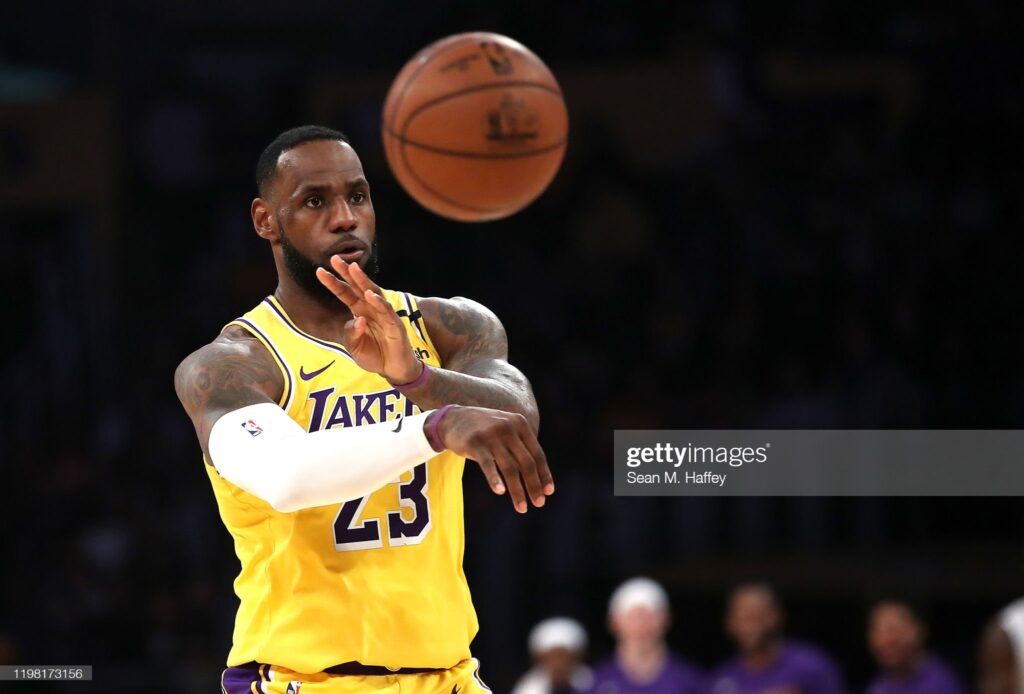
James has dished out 10+ assists 304 times in the regular season during his career. Of those games he has dished out 15+ assists 23 times. His career high is 19 assists which he has done twice – first against the Atlanta Hawks on January 15, 2018, and then against the Orlando Magic on January 15, 2020.
Rebounds
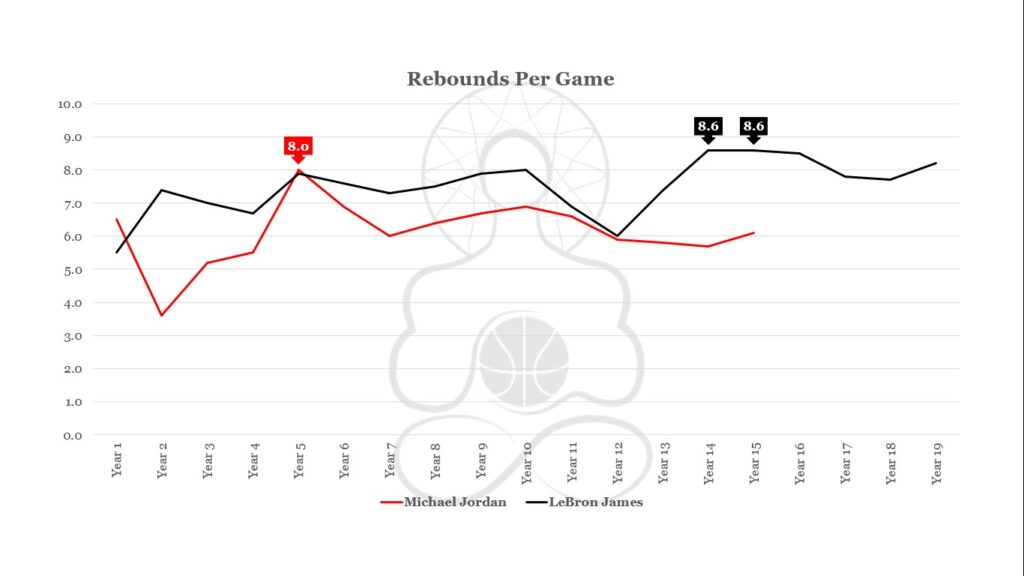
LeBron James has averaged 8+ rebounds five times in the regular season during his career, while Jordan has never done this.
Jordan has taken 10+ rebounds 151 times in the regular season during his career. His career high is 18 rebounds which he has taken twice in his career.
James has taken 10+ rebounds 337 times in the regular season during his career. His career high is 19 rebounds which he took against the Charlotte Bobcats on January 11, 2008.
NBA Playoffs
Michael Jordan
13 seasons – 179 games
33.4 / 6.4 / 5.7 / 3.0 / 49-33-83
What needs to be highlighted is that 24 seasons after his last playoff game, Jordan still holds the record for the highest playoff scoring average.
LeBron James
15 seasons – 266 games
28.7 / 9.0 / 7.2 / 2.6 / 49-34-74
James has played 87 more games (and counting) than Jordan.
Bill Simmons’ 42 Club
In 2006 Bill Simmons’ wrote a column making the case for why Dirk Nowitzki needed to be included in the conversation for the greatest players. In the column, he proposed a simpler way of deducing greatness from statistics.
Named the 42 Club, Simmons says “Why make it so complicated? Just add up the point, rebound and assist averages for franchise guys during the playoffs: If the number tops 42, you’re probably talking about a pantheon guy. You could even call it the 42 Club. Since it’s my idea, I only allowed guys who played 13 or more playoff games in one postseason to be eligible, since that’s a legitimate sampling (more than a month of basketball at the highest level). “
Since this is a column debating two of the greatest NBA players ever, let us up the stakes to include stocks (steals & blocks), and call it the 45 Club.
Michael Jordan’s 45 Club seasons:
1989 – 52.7
1990 – 54.4
1991* – 49.7
1992* – 49.2
1993* – 50.8
1997* – 46.3
LeBron James’ 45 Club seasons:
2006 – 46.8
2008 – 46.7
2009 – 54.2
2012* – 48.2
2015 – 52.7
2016 – 47.0
2017 – 52.9
2018 – 54.5
2020* – 49.3
*NBA Championship season
It is clear that both players were beasts in the playoffs. James’ superior passing and rebounding numbers give him the edge over Jordan, 9-6
Jordan, however, won more championships in his 45-Club seasons, edging out James four to one.
Part II – The Nuanced Arguments
Part Two of this article dive into nuances of the Jordan vs James debate. Rings, numbers, and awards are objective; the arguments laid out in this section provide context to the objectivity.
Simply put, if there was no context to the number of NBA championships a player has won then it would seem that Robert Horry, who has seven rings, is a better player than Jordan or James.
Record against .500 teams
Here is a complete list of the All-NBA team players Michael Jordan played with during his Playoff runs:
Quality of Teammates
Here is a complete list of the All-NBA team players Michael Jordan played with during his Playoff runs:
Scottie Pippen:
1992 2nd Team All-NBA
1993 3rd Team All-NBA
1995 1st Team All-NBA
1996 1st Team All-NBA
1997 2nd Team All-NBA
1998 3rd Team All-NBA
Scottie Pippen was a defensive legend. I would not surprised if guards and forwards from the 80’s and 90’s still have nightmares of their matchups with him.
Many believe that if Pippen was not in Jordan’s shadow, he would’ve had a greater career. The argument, a valid one, is that Pippen lead the Bulls to 55 and 47 wins in ’94 and ’95 respectively in Jordan’s absence. He also finished third in MVP voting in 1994.
However, let us debunk two big myths surrounding the legend of Scottie Pippen.
Myth One – Pippen was living under Jordan’s shadow:
It is important to take a step back and understand the whole NBA was living under Jordan’s shadow in the 80’s and 90’s.
Bird and Magic opened the door, but Jordan’s sheer persona ripped open a floodgate.
For all the credit that David Stern gets for making the NBA a global, it is no coincidence that he became commissioner in ’84, the year Jordan was drafted into the league.
Myth Two – Jordan would not have won rings without Pippen:
Every great player had some watching his back. Kareem Abdul Jabbar had Magic Johnson, Larry Bird had Kevin Mchale, Kobe Bryant had Shaquille O’Neal, Tim Duncan had Tony Parker and Manu Ginobili, and Bill Russell had a slew of them.
Just like the greats before and after him, Jordan needed every member for each championship; Kerr and Paxson practically won him his ’93 and ’97 championships.
To use this as an asterisk against Jordan’s greatness is to be willfully ignorant of the fact that basketball is a team sport and that a championship demands greatness from the entire squad.
Pippen was a great player and will continue to be one of the 50 greatest players for a very long time.
Could Pippen have had a “better” career than the one he had with Jordan and the Bulls? Possibly.
Would he want to give up the six rings he won with Jordan and the Bulls to find out? No chance. And if you disagree, feel free to ask him directly.
Now compare that to LeBron James’ best sidekicks during his playoff runs
Dwyane Wade:
2011 2nd team All-NBA
2012 3rd team All-NBA
2013 3rd team All-NBA
Kyrie Irving:
2015 3rd team All-NBA
Anthony Davis:
2020 1st team All-NBA
I know what you are thinking. “LeBron had much less help!”.
Yes, James had five All-NBA teammates during his playoff runs, compared to Jordan’s six.
What is important, though, is what did those runs amount to?
For James, four rings and two finals’ losses; for Jordan, five rings and one Eastern Conference Semi-Finals loss (his shortened ’95 season).
Quality of Opposition
Michael Jordan legacy here is unquestionably bigger than James’.
James seems to have the edge in playing in the modern era. Recency bias coupled with the more flashier high-scoring NBA of today help inflate James’ opponents profiles.
This section is divided into two sections:
One, the quality of teams and players that Jordan and James beat on the way to their NBA Championships.
Two, the number of rings they “stole” by beating a potential champion.
Most would attempt this comparison by saying Jordan beat to a ton of Hall of Famers en route his championship rings. This is a meaningless argument to make and is unfair to James as many of his peers will be Hall of Famers by the time they finish their careers.
The better way to do this would be to see how many of the best teams were victims of the two players’ greatness.
Michael Jordan’s Opposition
(Teams with 50+ wins highlighted)
(*Teams with 60+ wins)
1991:
- Round 1 vs. New York Knicks (3-0): Patrick Ewing (2nd team All-NBA)
- Round 2 vs. Philadelphia 76ers (4-1): Charles Barkley (1st team)
- Conference Finals vs. Detroit Pistons (4-0): Joe Dumars (3rd team)
- NBA Finals vs. Los Angeles Lakers (4-1): Magic Johnson (1st team), James Worthy (3rd team)
1992:
- Round 1 vs. Miami Heat (3-0): Tim Hardaway (2nd team)
- Round 2 vs. New York Knicks (4-3): Ewing (2nd team)
- Conference Finals vs. Cleveland Cavaliers (4-2): Brad Daughtery (3rd team), Mark Price (3rd team)
- NBA Finals vs. Portland Blazers (4-2): Clyde Drexler (1st team)
1993:
- Round 1 vs. Atlanta Hawks (3-0): Dominique Wilkins (2nd team)
- Round 2 vs. Cleveland Cavaliers (4-0): Price (1st team)
- Conference Finals vs. New York Knicks (4-2): Ewing (2nd team)
- NBA Finals vs. Phoenix Suns (4-2): Barkley (1st team) (MVP)
1996:
- Round 1 vs. Miami Heat (3-0): No one.
- Round 2 vs. New York Knicks (4-1): No one.
- Conference Finals vs. Orlando Magic (4-0): Anfernee ‘Penny’ Hardaway (1st team), Shaquille O’Neal (3rd team)
- NBA Finals vs. Seattle Sonics (4-2): Shawn Kemp (2nd team), Gary Payton (2nd team)
1997:
- Round 1 vs. Washington Bullets (3-0): No one.
- Round 2 vs. Atlanta Hawks (4-1): No one.
- Round 3 vs. Miami Heat (4-1): Tim Hardway (1st team)
- Finals vs. Utah Jazz (4-2): Karl Malone (1st team) (MVP), John Stockton (3rd team)
1998:
- Round 1 vs. New Jersey Nets (3-0): No one.
- Round 2 vs. Charlotte Hornets (4-1): Glen Rice (3rd team)
- Conference Finals vs. Indiana Pacers (4-3): Reggie Miller (3rd team)
- NBA Finals vs. Utah Jazz (4-2): Malone (1st team)
That’s 24 All-NBA players including two MVPs en route six championships.
If you take into account all the All-NBA players Jordan’s Bulls have beaten in the playoffs that number climbs to 27, i.e. ’89 – Price (3rd), Ewing (2nd); ’90 – Barkley (1st).
Additionally, Jordan’s Bulls beat sixteen 50+ win teams, swept nine teams (including three with 50+ wins), with a record of 90-26 (77%) in his Championship years.
Expand that to include all his playoff seasons and the numbers look like this: beaten twenty 50+ win teams, with a record of 119-60 (66%), and swept twice by Celtics (’86, ’87).
LeBron James’ opposition
2012:
- Round 1 vs. New York Knicks (4-1): Tyson Chandler (3rd team)
- Round 2 vs. Indiana Pacers (4-2): No one.
- Conference Finals vs. Boston Celtics (4-3): Rajon Rondo (3rd team)
- NBA Finals vs. Oklahoma City Thunder (4-1): Kevin Durant (1st team), Russell Westbrook (2nd team)
2013:
- Round 1 vs. Milwaukee Bucks (4-0): No one.
- Round 2 vs. Chicago Bulls (4-1): No one.
- Conference Finals vs. Indiana Pacers (4-3): Paul George (3rd)
- NBA Finals vs. San Antonio Spurs (4-3): Tim Duncan (1st team), Tony Parker (2nd team)
2016:
- Round 1 vs. Detroit Pistons (4-0): Andre Drummond (3rd team)
- Round 2 vs. Atlanta Hawks (4-0): No one.
- Conference Finals vs. Toronto Raptors (4-2): Kyle Lowry (3rd team)
- Finals vs. Golden State Warriors (4-3): Stephen Curry (1st team) (MVP), Draymond Green (2nd team), Klay Thompson (3rd team)
2020:
- Round 1 vs. Portland Trailblazers (4-1): Damian Lillard (2nd team)
- Round 2 vs. Houston Rockets (4-1): James Harden (1st team), Russell Westrbook (3rd team)
- Conference Finals vs. Denver Nuggets (4-1): Nikola Jokic (2nd team)
- Finals vs. Miami Heat (4-2): Jimmy Butler (3rd team)
That’s 17 All-NBA players and one MVP en route three championships.
If you take into account all the All-NBA players James has beaten in the playoffs that number climbs to 23, i.e. ’06 – Gilbert Arenas (3rd); ’07 – Arenas (3rd), Chauncey Billups (3rd); ’09 – Billups (3rd); ’11 – Derrick Rose (1st)(MVP); ’14 – Al Jefferson (3rd) & George (3rd); ’17 – Isaiah Thomas (2nd), Demarr DeRozan (3rd); ’18 – DeRozan (2nd), Victor Oladipo (3rd).
Additionally, James’ teams beat five 50+ win teams, and swept three teams, with a record of 64-24 (72%) in his Championship years.
Expand that to include all his playoff seasons and the numbers look like this: beaten twelve 50+ win teams, with a record of 224-91 (71%), and sweeping a total of twelve teams, while getting swept against the 2018 Golden State Warriors.
How many NBA rings did they steal?
Cavaliers’ coach Tyronn Lue when asked James’ about legacy said, “Michael Jordan, the same way.”
He told Adrian Wojnarowski at The Vertical last season. “There’s a reason why guys like Charles Barkley, Patrick Ewing and Reggie Miller don’t have championships, because of Michael Jordan. And now, in this era, because of LeBron James.”
This, in my opinion, is what will determine LeBron James’ eventual legacy.
Let’s take a look at the damage Michael Jordan and James caused during their Championship runs.
For context I have included the names of players who, if it were not for Jordan or James that season, would have gone on to win the NBA Championship.
Simply put, Jordan and James stole these rings.
Jordan’s Run
In his 13 year playoffs run, Jordan has beaten:
Isiah Thomas in the 1991 NBA Eastern Conference Finals
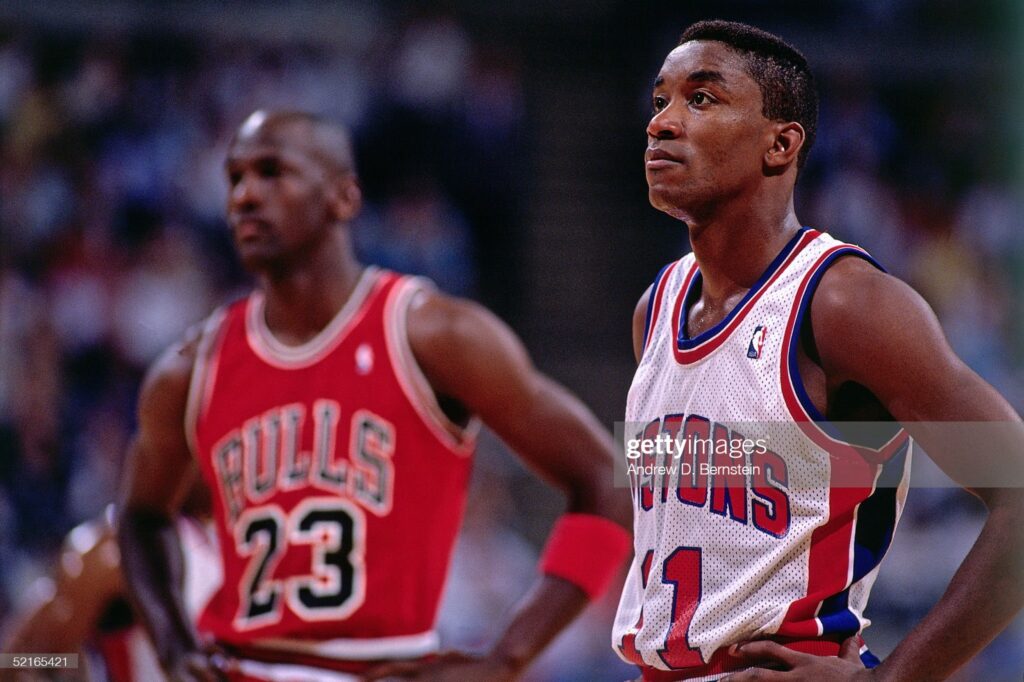
In the 1991 NBA Playoffs, Thomas’s Detroit Pistons were coming off back-to-back NBA championships in 1989 and 1990). Not only that, his Pistons beat the Atlanta Hawks in Round 1, and swept the Boston Celtics (second-best team in the East) in Round 2.
Joe Dumars was having a career scoring year (20.4 ppg), and Thomas, despite missing 34 games, finished with (16.2 ppg and 9.3 assists). The Pistons brought back the same key pieces they had won the 1990 championship with.
Did not matter; they had no answer for Jordan. A raging Jordan had put on 15 pounds of muscle in the offseason with the sole intention to beat the Pistons.
Thomas was so pissed off after the sweep he infamously refused to shake Jordan’s hand after the Game 4 loss.
Magic Johnson in the 1991 NBA Finals
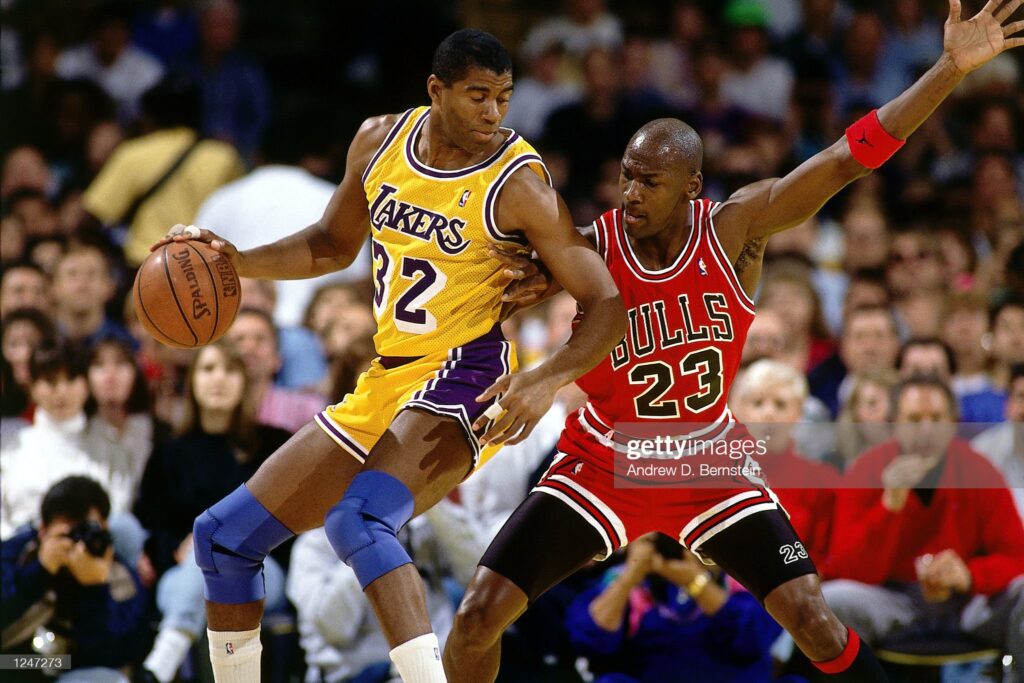
Magic Johnson (31) was still at his peak and finished with 19.4 ppg and 12.5 apg (second-best in the NBA behind John Stockton). He was a five-time NBA champion by then – his last ring coming in 1988.
The matchup went down as one of the most anticipated in NBA history as Jordan and Johnson represented two ends of the spectrum: Johnson the accomplished veteran and Jordan the up and coming star.
Jordan wasted no time is settling that debate, wiping out a loaded Lakers team (Johnson – James Worthy – Byron Scott – Sam Perkins – Vlade Divac) in five games.
Clyde Drexler in the 1992 NBA Finals
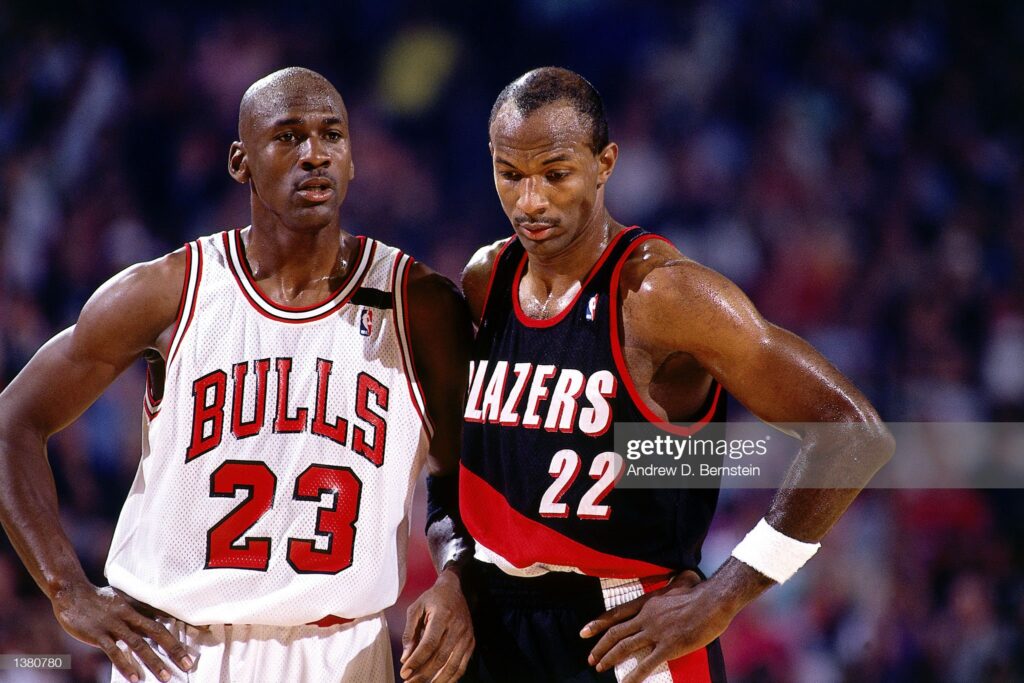
Clyde Drexler was the second best player in the NBA in 1992.
He finished fourth in scoring (25.0 ppg), was the only player other than Jordan to average 25-6-6 (ppg-apg-rpg), was the best player on the second best team, and finished second in the MVP voting that season.
Naturally many players, coaches and media began to speculate that Drexler (28) was in line to threaten Jordan’s (29) dominance.
Jordan detested the comparison between him and Drexler. He decided to settle the chatter by beating Drexler dropping an average of 35.4 ppg in the six-game series.
Jordan continued to demoralize him during practice while on the ‘92 USA Olympics team, until Magic Johnson stepped in asked him to take it easy.
Drexler eventually won a ring with the Houston Rocket in ‘95. Guess who wasn’t in the ‘95 Finals?
Patrick Ewing in the 1993 NBA Eastern Conference Finals
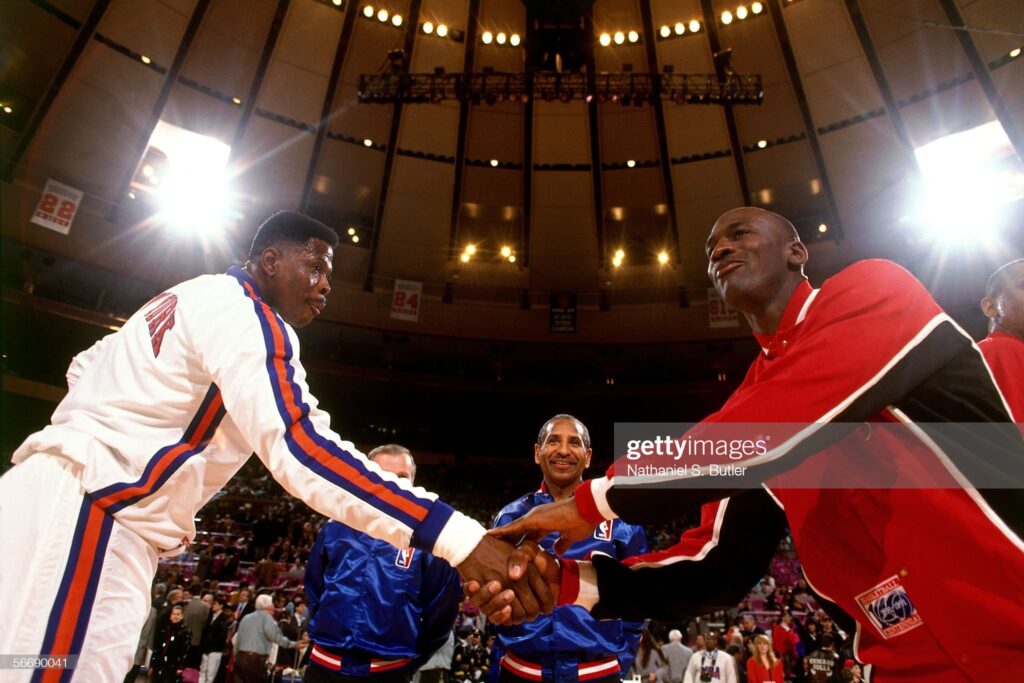
Patrick Ewing and Jordan formed one of the greatest rivalries in the history of the NBA
They met five times in the playoffs (‘89, ‘91, ‘92, ‘93, ‘96) with Jordan and the Bulls winning all five contests with a total record of 19-8.
While the ‘92 contest was one of the greatest seven-game battles in the NBA history, it was in ‘93 that Ewing was the closest to a ring.
With Ewing as their best player, the New York Knicks had won 60 games for just the second time in franchise history (they have not won those many since) and were the best team in the East and second best in the NBA behind the Phoenix Suns.
Ewing and the Knicks won the first two games, and the world rushed to declare an end to Jordan’s dominance. Jordan’s Bulls had not lost back-to-back games since dropping game 2 in the 1990 NBA Easter Conference Finals against the Detroit Pistons.
That did not phase the Bulls and Jordan. They rallied against the Knicks who dropped the next four games straight (the last two games by a total of just 11 points).
Charles Barkley in the 1993 NBA Finals
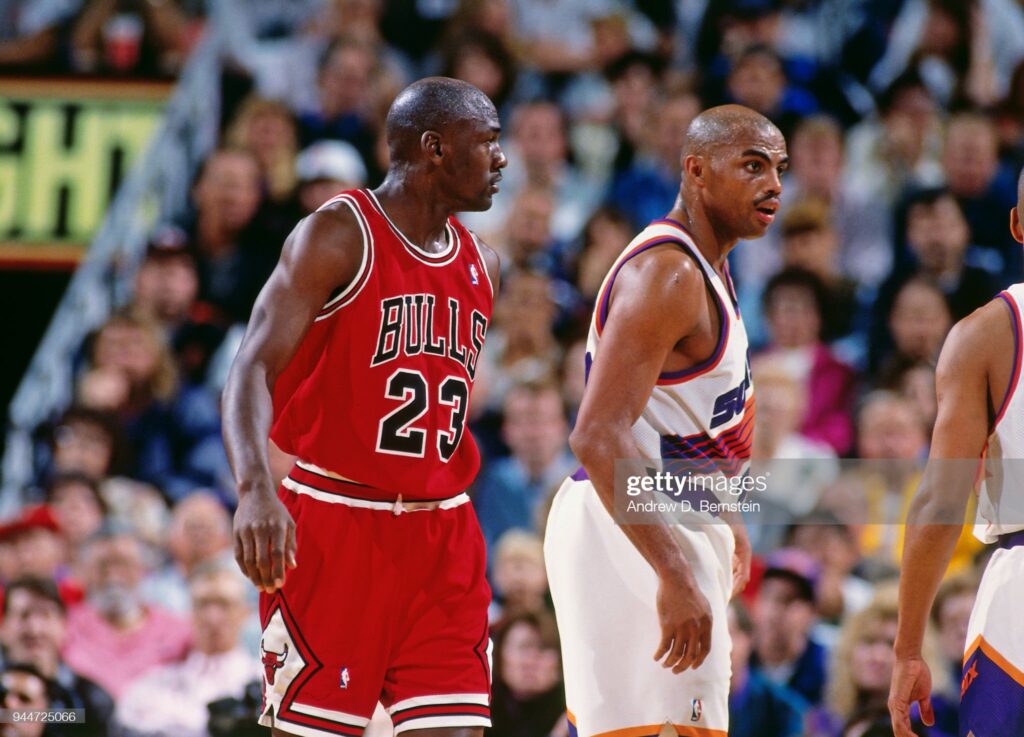
While with Philadelphia, Barkley’s previous two meetings with Jordan did not go to well.
This was Barkley’s best chance at the title and he gave it everything he had.
He had won the NBA regular season MVP by a whopping 59 first place votes to Jordan’s 13. He was the best player on the best team in the regular season – the Phoenix Suns finished with 62 wins.
He then put up incredible numbers, averaging 27 ppg, 13 rpg and 5.5 apg, and keeping the series close – the series was decided by total of 36 points across six games.
Jordan, though, was pissed that he did not win regular season MVP. He clearly believed it was his trophy and wanted to remind everyone in the NBA that he was still the best player.
No problem. Jordan annihilated all that the Suns threw in his way, dropping 41.0 ppg in six games – including a monstrous 55-point Game 4 – en route to his third NBA ring, and completing his first three-peat.
Shaquille O’Neal & Anfernee “Penny” Hardaway in the 1996 NBA Eastern Conference Finals
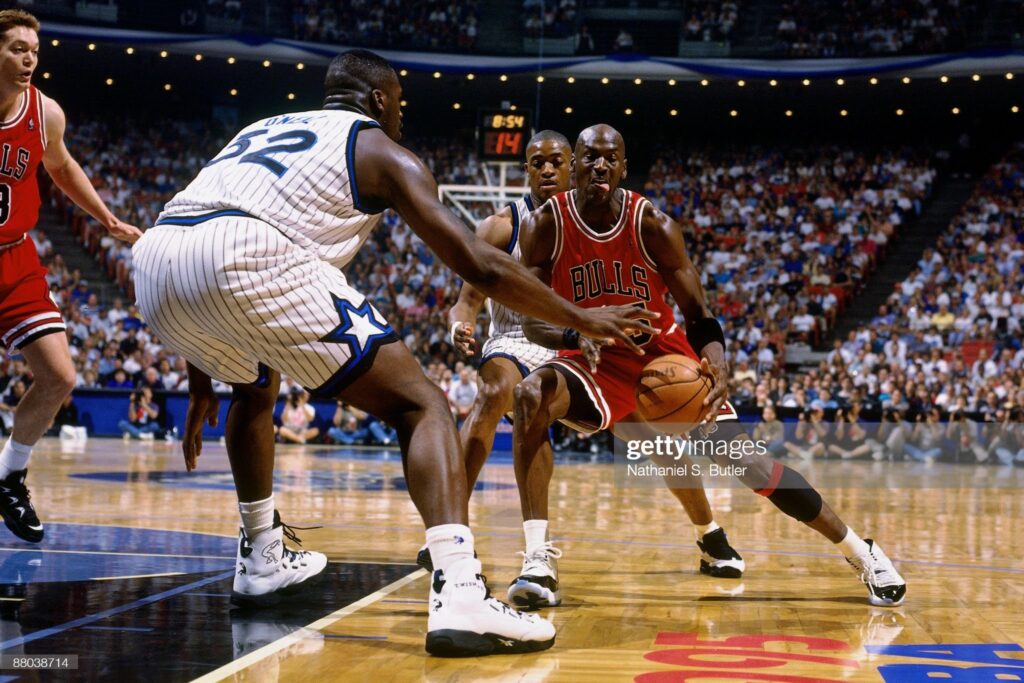
In 1996, the Orlando Magic were reigning NBA Finalists. They had the third best record in the NBA (60 wins), were the second best passing team in the NBA behind the Utah JAzz, and their young duo of Shaq+Penny combined for 48.3 ppg/15.3 rpg/10.0 apg/2.6 spg/2.6 bpg. They were 23 and 24 respectively.
Jordan on the other hand was 32, coming off 18 months of retirement and half a season in 1995.
After losing to the Orlando Magic in six games in Round 2 of the 1995 NBA playoffs, critics rushed to write the eulogy for Jordan’s career. They claimed that if he could not get past a young Orlando Magic team at his peak, then he was done.
Big mistake.
Jordan went on a mission in 1996, unleashing the Bulls to a 72-10 regular season record. and destroying the Orlando Magic in the 1996 NBA Eastern Conference Finals; not just beating Shaq+Penny, but sweeping them.
Penny was never the same again and Shaq left for the Los Angeles Lakers.
Gary Payton & Shawn Kemp in the 1996 NBA Finals
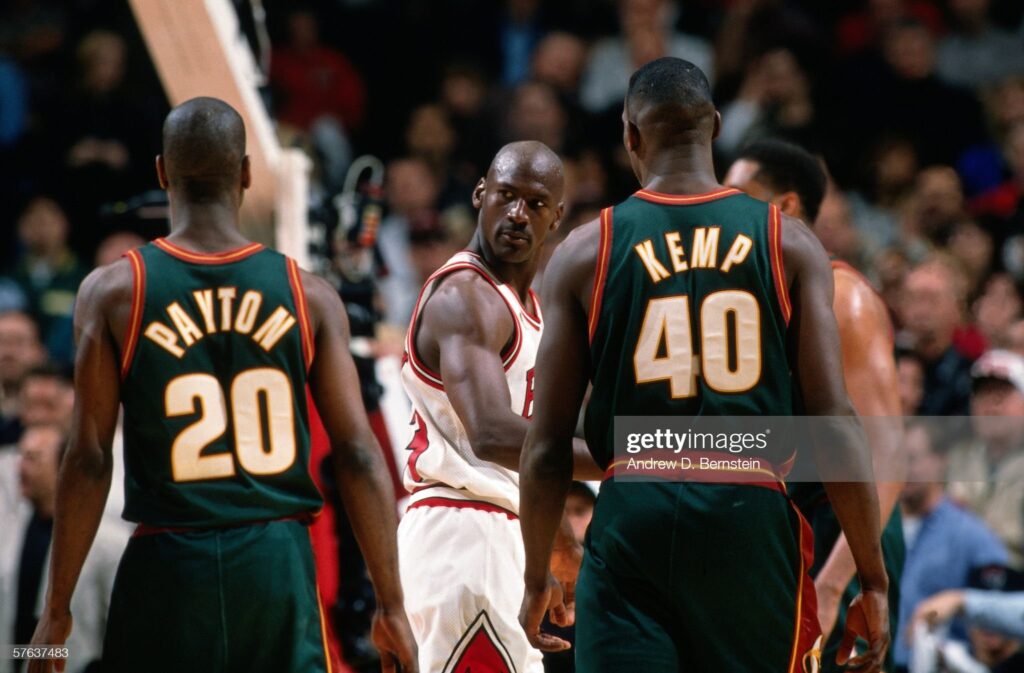
The Seattle Supersince were the second-best team in the NBA. They finished with 64 wins, and had Gary “The Glove” Payton, and Shawn Kemp – both 2nd team All-NBA – as their best players.
They were a highly balanced team with four of their players averaging 15+ ppg.
A Sonics-Magic was the most anticipated matchup at the time.
Payton vs. Hardaway and Kemp vs. Shaq.
Master vs. Master and Monster vs. Monster.
Only the Jordan decided to spoil the party.
Incensed by the doubt a failed 1995 campaign raised in the minds of all around him, Jordan unleashed holy hell in the playoffs, averaging a league leading 30.7 ppg, and wrapping the ‘96 championship with a record of 15-3 and ring no. 4.
Gary Payton and Shawn Kemp never came close again.
Karl Malone in the 1997 NBA Finals
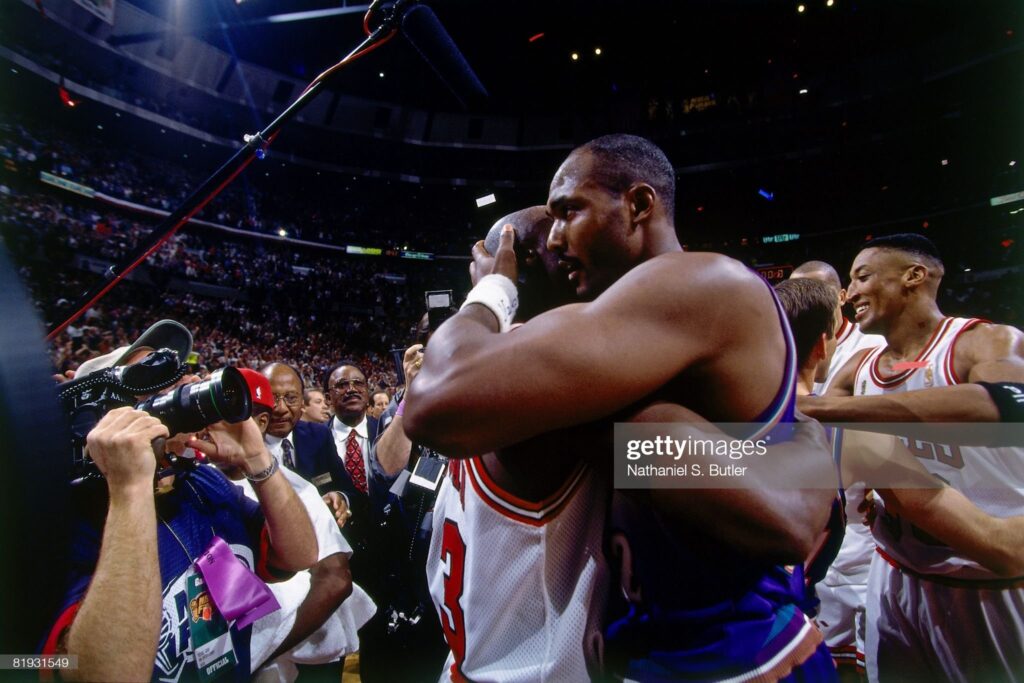
Malone tops the list of players whose championship legacies Jordan ruined.
This was Malone at his apex. He averaged 27.4 ppg (2nd in the NBA), 9.9 rpg and was second to Shaq in FG% with 55%. He won the regular season MVP
Even at the time, this was believed to be a mercy award simply because everyone was tired of giving it to Jordan.
Jordan, who had led the Bulls to 67 wins (a season after 72-wins the previous season), and also led the lead in scoring disagreed with the NBA’s choice for MVP.
He proceeded to establish who is boss, dropping 38 points in Game 5 while fighting 103-degree fever, and averaging 32 ppg/7rpg/6 apg en route beating the Jazz in six games for NBA ring No. 5.
Karl Malone in the 1998 NBA Finals:
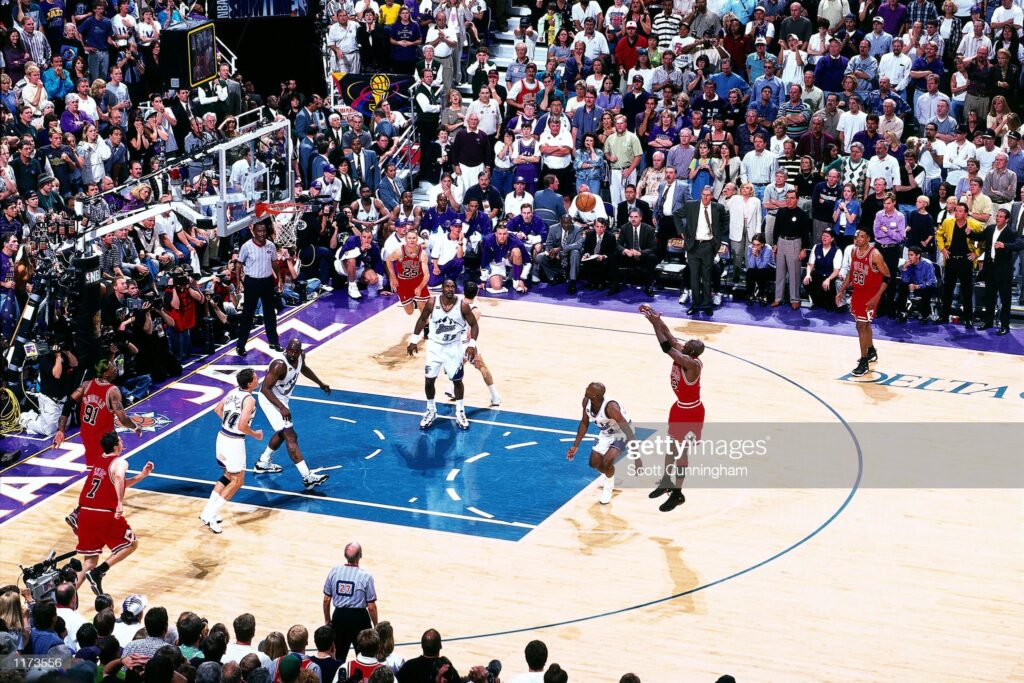
Another 60+ win season.
Another meeting with the Utah Jazz in the NBA Finals.
News floating that the Bulls franchise would not be around for another season.
Another shot at a three-peat and cementing his legacy forever.
Jordan stole the ball and made one of the greatest shots in NBA history.
1998 NBA Finals – Chicago Bulls vs. Utah Jazz
Ring No. 6.
Malone would never recover.
Honourable mentions:
Brad Daughtery (‘92 NBA Eastern Conference Finals), Alonzo Mourning & Tim Hardaway (‘97 NBA ECF), and Reggie Miller (‘98 NBA ECF).
If you are keeping score at home, Jordan stole nine rings away from teams and players who were within striking distance of winning the championship that (respective) season.
LeBron James’ Run
In his 14 season playoffs run, James has beaten:
Kevin Durant, Russell Westbrook & James Harden in the 2012 NBA Finals:
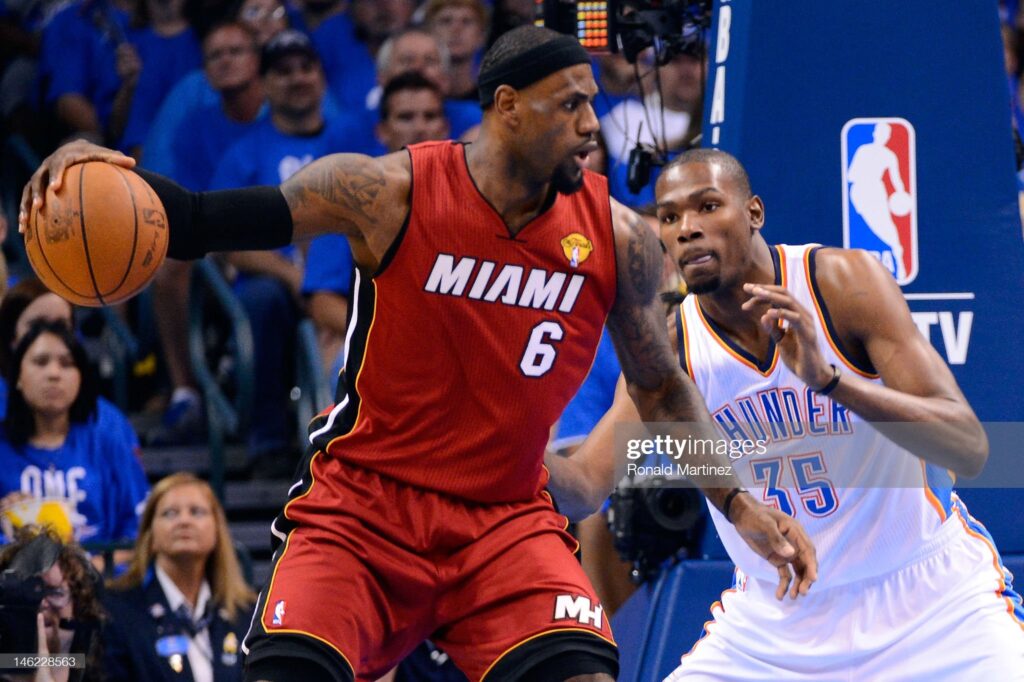
The Miami Heat Big Three were upset in the 2011 NBA Finals.
The Oklahoma City Thunder trio weren’t expected to get to the Finals this quickly.
But after beating the Los Angeles Lakers (4-1) and upsetting the San Antonio Spurs (4-2) the Thunder looked primed to give LeBron James and the Heat a run for their money.
That didn’t work out too well.
James found his inner-beast that season. He and the Heat bundled up the Thunder in five games, and broke the team before they had a chance to become a dynasty.
Tim Duncan in the 2013 NBA Finals
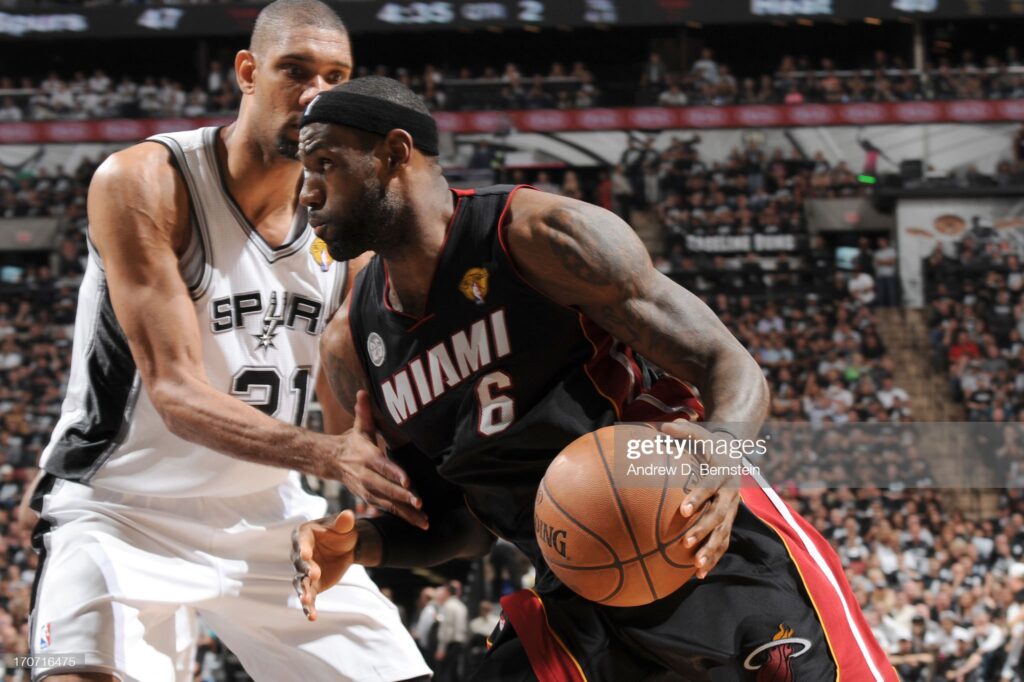
This series was probably the most emotional roller coaster I have ever ridden. So you can imagine what Pop, Duncan and the Spurs felt.
The Spurs were up 3-2 in the series and leading by 3 points (95-92) with 19 seconds left in regulation.
Miami took a timeout.
When they took the court, Pop chose to keep Duncan – his best player – on the bench.
James brings the ball up, takes and misses a wide open 3.
With Duncan – among the greatest rebounders in the history of the NBA – on the bench, Chris Bosh gets the rebound and passes it to Ray Allen.
Allen, a master at his craft, back peddles towards the baseline, and without looking down launches, arguably, the greatest shot in NBA history.
The shot often takes away from the leap James made in that series.
The 2013 Finals MVP he became a certified Game 7 killer scoring 37 points against a feisty Spurs defence, and quashing Duncan’s hope for a fifth ring that season.
Stephen Curry in the 2016 NBA Finals
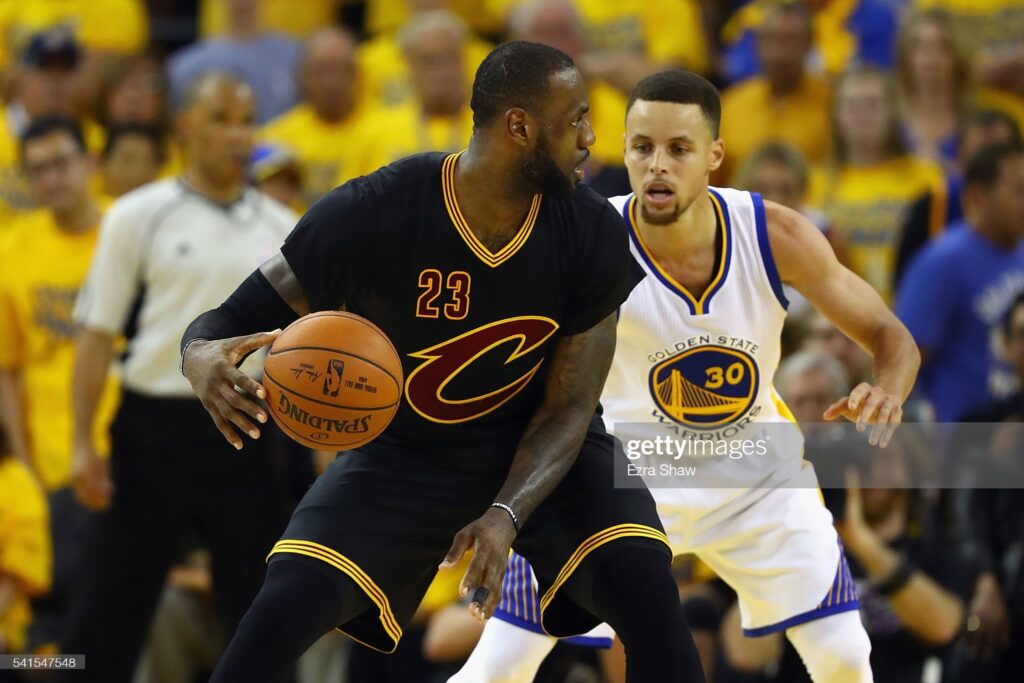
One of the 10 greatest NBA playoffs series ever.
The Golden State Warriors had finished the season with the best regular season record in the history of the NBA – 73 wins.
Curry won his second MVP trophy in two years, and the Warriors looked indomitable.
They were, however, pushed to the edge when they found themselves down 1-3 against the Thunder. They rallied back and won that series, winnin three games in a row.
The Cleveland Cavaliers finished with 57 wins, and rolled through the 2016 NBA Eastern Conference Playoffs. They swept the Detroit Pistons and the Atlanta Hawks in Rounds 1 & 2, and beat the Toronto Raptors in six games in the Eastern Conference Finals.
Then they found themselves down 1-3 to the Warriors. James was hearing the haters, “In 2015 he was excused for not having Irving and Love. Now, despite having a fully healthy squad, James is about to be eliminated.”
It seemed like the end of the road.
Not for James.
He won this series by sheer force of will despite facing humiliating a elimination.
James rallied his troops and rallied to win three straight games to win his third ring.
Even if you do not have the time to watch a minute of that series, watch this chase down block that will tell you everything you needed to know about James as his will to win his third ring.
Honorable mentions: Paul George (‘13 & ‘14 NBA Easter Conference Finals)
That’s three (3) rings James stole from players that could have and deserved to win it all that respective season.
__________________________
An era of difference
The East was truly the beast during Jordan’s peak. However, the No. 1 seed in the East did not, in any way guarantee a free ride to the Finals, let alone a championship. Add to that the fact that Jordan played in an era where the defence was more physical and near tortuous, and you begin to get a sense that, at this stage of his career, James isn’t close to matching, let alone overtaking Jordan’s career.
It also needs to be said: James joined the NBA in the year the rule against hand-checking was introduced. Simply explained, until the 2004-’05 season, a defensive player could place a hand on the offensive player as long as a “shot” was not being obstructed. This allowed defenders before the 2004-’05 season to muscle and harass their opponents until just before the shot. While this may seem trivial, it isn’t. A better visual explanation can be found here. The elimination of hand-checking is why many older players believe today’s NBA players are too soft.
James is already one of the ten greatest players:
(in alphabetical order)
Larry Bird
Kobe Bryant
Wilt Chamberlain
Tim Duncan
Magic Johnson
Kareem Abdul-Jabbar
LeBron James
Michael Jordan
Shaquille O’Neal
Bill Russell
He will need another ring to be included in the conversation of the greatest ever.
But, if he manages to pull this 2022 Lakers team through to the playoffs and somehow, against all odd, win the 2022 NBA championship, I am willing to have the conversation.
Basketballbaba.com is a free-to-read resource on the NBA. You may consider showing your appreciation by buying something from Baba’s store. It is a combination of affiliate links to basketball books and gear, and also some exclusive BasketballBaba merchandise. for every purchase you make, 5% of the profits go towards the Dribble Academy Foundation.
